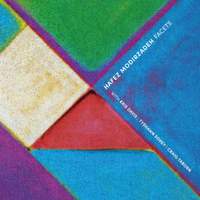Recording of the Week,
Hafez Modirzadeh - Facets

Saxophonist Hafez Modirzadeh is a musician who’s spent a significant part of his career integrating two seemingly disparate musical traditions: that of American jazz music and traditional Persian music. Growing up in North Carolina to an Iranian father and a mother of both Russian and Irish descent, Modirzadeh’s introduction to jazz came in his teenage years after being exposed to players like Charlie Parker and Sonny Rollins, taking up the sax in due course. Despite having heard traditional Persian music from his father at an early age - he played the tombak (a traditional Persian drum) as well as sang at home - it wasn’t until moving to the Bay Area to study under Persian musician Mahmoud Zoufonoun that he would fully dive into this traditional proper, beginning to draw his own comparisons and notice commonalities with that of jazz music.
This would eventually lead Modirzadeh to the development of his own musical temperament system, which he dubbed ‘chromodality’, during his tenure studying at Wesleyan University in Connecticut. By re-tuning eight of the notes within the octave, Modirzadeh unlocks strange (to our ears, at least) harmonies that are more reminiscent of seldom-used archaic tuning systems like equal temperament, as well as traditional Middle-Eastern music where the use of microtonality is more common. Similar territory has been covered by composers like La Monte Young, best known for his work ‘The Well-Tuned Piano’, novel for its use of ‘just intonation’ and its ongoing nature - though Young has been writing the piece since 1964, he has never signed it off as a finished work. Other recommended readings include the work of Czech composer and music theorist Alois Hába, whose past experiments make use of tuning systems that divide the octave into up to seventy-two distinct notes, each note of the conventional ‘Western’ system split into six unique tones. Modirzadeh matches these ‘chromodal’ tunings by altering his own saxophone technique, including playing in altered fingerings. Naturally this is not simply a novelty for Modirzadeh, nor is it his first outing in the realm of chromodality; 2012’s Post-Chromodal Out! - also released on PI Recordings - is similarly structured in a selection of mostly short pieces exploring the saxophonist’s harmonic approach.

Modirzadeh’s latest recorded work, Facets, features the saxophonist with a rotating trio of pianists, all playing this uniquely altered instrument; Kris Davis, Craig Taborn, and Tyshawn Sorey. It’s Taborn who opens the record with his eponymous ‘Facet Taborn’, with some of the most dissonant use of this altered tuning on the record - perhaps testing the waters for new listeners. The proceeding ‘Dawn Facet’, however, draws a more picturesque setting, with Modirzadeh’s sax gently huffing over the top. Fans of avant pianists like Cecil Taylor will no doubt enjoy Davis, who gets her moments to delve deep into this re-tuned piano on pieces like ‘Facet 34 Defracted’ and ‘Facet 31 Wake’, while Sorey gives ‘Facet BB’ a similarly aggressive interpretation, though they might not be the easiest pieces to listen to.
Though the piano forms much of this record’s character, there’s still Modirzadeh’s name on the cover - much of his input on the record comes from a composer’s perspective, but when he does show on a track it almost provides some welcome context to the often unsettling works. While Facets undoubtedly draws from Modirzadeh’s interest and study of Persian music, it avoids all the trappings of sounding like cliché ‘jazz mixed with world music’, creating something of great uniqueness with a real personal touch. Once one’s ears get accustomed to it, the unconventional tones can be incredibly refreshing, and there’s plenty to hear of it in the hour-plus runtime of the record; and outside of these unusual harmonies, the pieces are excellent in themselves, sparse as they are spontaneous.



